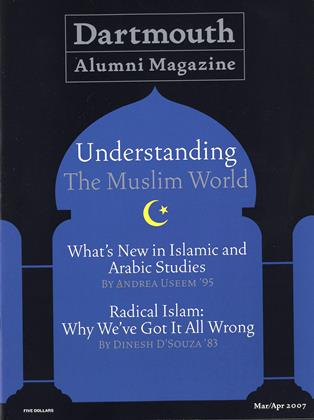Fifty years ago, only one courseat Dartmouth covered Islam.
ON THE EVE OF EARNING HIS Doctorate in Islamic histoiy in the late 1960s, John Voll '58 sat down to write Fred Berthold '45, his former professor. Berthold, now a professor emeritus, smiles as he recalls the letter today. "It read, 'Thank you, because whenever I had a question about Islam, you always said, 'I don't know.' So I had to go and find out for myself.'"
Berthold, an expert in ancient and medieval Christianity, had been Voll's professor in a course called 'Asian Religions"—the only course in the mid-1950s that touched on Islam. The usual professor, Wing-tsit Chan, was away on sabbatical, and Berthold said he "stupidly agreed" to fill in, though he knew little about Islam or other Eastern religions.
"Voll sat in the front row and his hand would shoot up about eight times every class to ask, 'What does it mean when the Koran says this?' " recalls Berthold.
Voll, now director of Georgetown University's Center for Muslim-Christian Understanding, is a distinguished historian of Islam, frequently called upon to explain Muslim viewpoints to a press and public hungry for insight. He is one of several accomplished scholars whose interest in the Muslim world was sparked at Dartmouth, even at a time when the College had few resources available.
Shortly after the fall semester started, Eickelman says he received a letter from Osman's father, a school headmaster in Khartoum. "It read, 'If you see my son doing anything un-Islamic, beat him on my behalf.' " Puzzled, Eickelman did not respond. But Osman's unselfconscious displays of faith imnressed him.
this immodesty, Osman was the lone swimmer to keep his trunks on.
Yet Osman, who now lives in Silver Spring, Maryland, says the respect shown him by Eickelman, classmates and professors helped him maintain his faith and religious practice while far from home. It wasn't always easy. Ramadan was especially difficult since no food service was open after 6:30 p.m., when he could break the daylong fast, recalls Osman, who would sustain himself with a cup of tea brewed surreptitiously in his dorm room.
Osman's religiosity challenged the received wisdom of the era: that religion would become increasingly confined to private life, says Eickelman, who has seen that assumption overturned time and again. Inspired in part by his friendship with Osman, Eickelman pursued Islamic studies in graduate school, returning to Dartmouth as a professor in 1989. Osman, who had forged a friendship with Malcolm X, was instrumental in bringing the controversial Muslim leader to Dartmouth for a 1965 talk in Spaulding auditorium and an interview on WDCR campus radio less than a month before Malcolm X was assassinated in New York City.
 View Full Issue
View Full Issue
More From This Issue
-
 Feature
FeatureA Conversation With Jim Wright
March | April 2007 By Jake Tapper ’91 -
 Feature
FeatureRadical Islam
March | April 2007 By DINESH D’SOUZA ’83 -
 Cover Story
Cover StoryA Better Understanding
March | April 2007 By ANDREA USEEM ’95 -
 Feature
FeatureNotebook
March | April 2007 -
 Feature
FeatureAlumni News
March | April 2007 By Scott Listfield '98, Scott Listfield '98 -
 TRADITIONS
TRADITIONSBook of Mystery
March | April 2007 By Julian Kesner ’00







